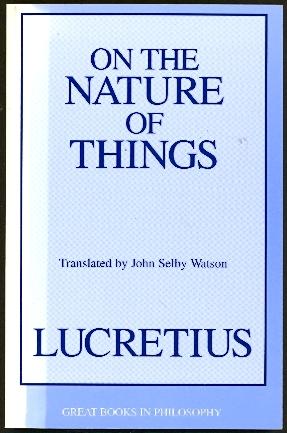
They coalesce into larger objects when they find themselves bouncing rapidly between other closely-packed atoms. Atoms are in constant motion: they are thrown in different directions by collisions with other atoms, and by their own spontaneous swerves.

Lucretius launches into his examination of the atom by investigating atomic motion. Epicureans set their minds at ease by understanding the workings of the natural world, which frees them from the fear of the unknown.

The work is distinguished by the fervor and poetry of the author.Lucretius begins by reflecting that the only happy life is that of the Epicurean nature only requires that “the body may be rid of pain, and that the mind, divorced from anxiety and fear, may enjoy a feeling of contentment” (Book II, lines 35-6 pages 18-19). In Book 6 the poet explains various atmospheric and terrestrial phenomena, including thunder, lightning, earthquakes, volcanoes, the magnet, and plagues. Book 5 describes the nature and formation of our world, astronomical phenomena, the beginnings of life on earth, and the development of civilization.

Book 4 explains the nature of sensation and thought, and ends with an impressive account of sexual love. In Book 3 he expounds the nature and composition of mind and spirit, proves their mortality, and argues that there is nothing to fear in death. In Book 2 he explains atomic movement, the variety of atomic shapes, and argues that the atoms lack colour, sensation, and other secondary qualities. In Book 1 he establishes the general principles of the atomic system, refutes the views of rival physicists, and proves the infinity of the universe and of its two ultimate constituents, matter and void. In six books compounded of solid reasoning, brilliant imagination, and noble poetry, he expounds the scientific theories of the Greek philosopher Epicurus, with the aim of dispelling fear of the gods and fear of death and so enabling man to attain peace of mind and happiness. He is the author of the great didactic poem in hexameters, De Rerum Natura ( On the Nature of Things). 55 BCE, but the details of his career are unknown.

Lucretius (Titus Lucretius Carus) lived ca. The digital Loeb Classical Library extends the founding mission of James Loeb with an interconnected, fully searchable, perpetually growing virtual library of all that is important in Greek and Latin literature.


 0 kommentar(er)
0 kommentar(er)
